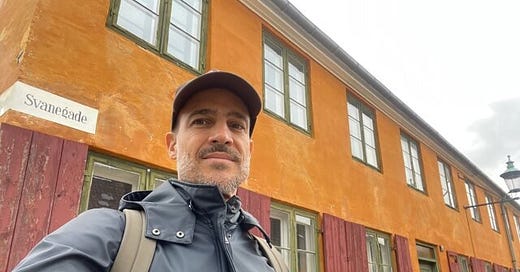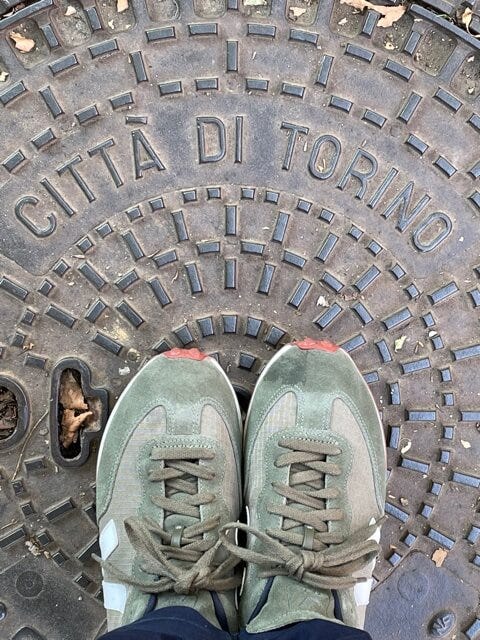For English, please scroll down to the British flag and italic text. Thanks!
🇧🇷 Ando meio confuso ultimamente. Escrevo vários parágrafos que no final não se conversam e o arquivo fica mofando no desktop. Sigo o texto conversando comigo mesmo ao longo do dia, no metrô, na bicicleta, no parque, no trem, no avião. Mas como estou em trânsito o tempo todo, os caderninhos ficam guardados nos bolsos da mala e mochila e não anoto nada. Viram bolhas de sabão.
Dito isso, resolvi juntar alguns pensamentos e descobertas aleatórios que têm me feito pensar e acalorar conversas pós-jantar. Tento fugir do canhão de notícias, mas é como tapar o sol com um chapéu de palha. Mesmo assim, se não estou rodando as ruas de bicicleta, estou enfurnado em livrarias, pesquisando títulos para uma nova aventura profissional.
Os jornalistas franceses e italianos estão sendo alvos de violência ao cobrirem os protestos antivacina. Assim como em manifestações no Brasil, sempre tem alguns seres mais exaltados que estragam a festa e infelizmente em grupo, nós, seres humanos, somos vis. Entendo o receio de tomar vacina, eu mesmo, no distante fevereiro, achava que esperaria para ver. Escolhi viver o presente e torcer para não haver efeitos colaterais. Queria poder sair de casa, abraçar os amigos, dançar e, principalmente, viajar. Se me transformar em um crocodilo ou ciborgue daqui a alguns meses ou anos, valeu a pena. A vida é hoje.
Li três romances em sequência, “Companions”, da dinamarquesa Christina Hasseholdt (médio), “Premier Sang”, da belga Amélie Nothomb (bom) e “Salvatierra”, do argentino Pedro Mairal (ótimo). Sendo assim, me liberei para ler o recém-lançado “Une brève histoire de l’Égalité”, do economista francês Thomas Piketty, de não ficção. É uma versão nova e resumida das suas grandes obras “O Capital no século XXI” e “Capital e Ideologia”. Quando nossos olhos são abertos para o conhecimento, fica impossível fechá-los novamente.
Com base em dados e estudos rigorosos, Piketty conta sobre as origens das desigualdades atuais. Ainda bem que o livro é curto, pois apesar de excelente, prefiro voltar para a ficção. O ponto interessante, que não só o Piketty escreve, mas que vários teóricos afirmam: o Estado somos nós, o sistema atual foi criado por humanos e pode ser modificado, cancelado, destruído. Basta saber o que colocar no lugar.
Em relação a meus manuscritos, queria escrever um conto para contar a história do filho que usou as cinzas da mãe cremada para fazer um diamante que carrega num pingente. O pingente será roubado num sequestro relâmpago, junto com R$ 10.000 em PIX. A parte das cinzas que ficou com a irmã será espalhada na beira de um rio, só que o vento levará boa parte delas para uma festa de casamento ali perto. Os convidados, com poeira nas roupas, olhos, narizes e bocas acharão que é areia.
Tem também o conto do cara que aceitou o convite de um charmoso homem mais velho para ir ao seu quarto de hotel e, no meio da transa, o velho tem um infarto e morre. Isso foi em Hong Kong e, apesar de não ter culpa de nada, talvez apenas por ter um corpo malhado e ser “caliente”, o cara segue preso esperando ajuda consular de seu país, onde o homossexualismo é crime.
Tudo são narrativas. O que é certo para um, pode ser errado para outro. Como dizia uma conhecida das antigas: “Opinião e gosto é que nem cú, cada um que cuide do seu”. Termino essa newsletter num tom esculachado (para usar a palavra chula do saber amical) e com uma recomendação: leia as fontes de suas notícias, pesquise de onde vem a informação, dê um Google, compare, pense e leia romances, nossa única salvação nesse presente que parece ficção científica de mau gosto. Saludos da Itália.
ps: assisti à série “The Chair” no Netflix e gostei.
🇬🇧 I've been a little confused lately. I write several stories that make no sense and the file gets moldy on the desktop. I follow the stories talking to myself throughout the day, on the subway, on a bicycle, in the park, on the train, on the plane. But since I'm on the go all the time, the notebooks are kept in my suitcase and backpack and I don't write anything down. They turn into soap bubbles.
That said, I've decided to piece together some random thoughts and discoveries that have been making me think and heat up after-dinner conversations. I try to escape the news, but it's like covering the sun with a straw hat. Even so, if I'm not riding a bike on the streets, I'm holed up in bookstores, researching titles for a new professional adventure.
French and Italian journalists are being targeted by violence as they cover anti-vaccine protests. As in demonstrations in Brazil, there are always more exalted beings who spoil the party. Unfortunately, in a group, human beings are vile. I understand the fear of getting the vaccine, myself, long ago February, thought I would wait and see. However, I chose to live in the present and hope there will be no side effects. I wanted to be able to leave home, hug friends, dance and, above all, travel. If I turn into a crocodile or cyborg in a few months or years, it was worth it. Life happens today.
I've read three novels in a row, “Companions”, by the Danish Christina Hasseholdt (so so), “Premier Sang”, by the Belgian Amélie Nothomb (good) and “Salvatierra”, by the Argentine Pedro Mairal (great). Therefore, I allowed myself to read the recently released “Une brève histoire de l'Égalité”, by the French economist Thomas Piketty, a nonfiction. It is a new and abridged version of his great works “Capital in the 21st century” and “Capital and Ideology”. When our eyes are opened to knowledge, it is impossible to close them again.
Based on rigorous data and studies, Piketty tells about the origins of current inequalities. Thankfully, the book is short, because despite being excellent, I prefer to go back to fiction. The interesting point, which not only Piketty writes, but which several theorists claim: the State is us, the current system was created by humans and can be modified, canceled, destroyed. The hard part is deciding what to replace it with.
Regarding my manuscripts, I wanted to write a short story to tell the story of the son who used his mother's ashes to make a diamond that he carries in a pendant. The pendant will be stolen in a quick kidnapping, along with U$10,000 in bank transfers (this is a new fashion in Brazil). The part of the ashes that remained with the sister will be scattered on the edge of a river, but the wind will carry most of them to a wedding party nearby. Guests with dust on their clothes, eyes, noses and mouths will think it's sand.
There's also the tale of the guy who accepted the invitation of a charming older man to go to his hotel room and, in the middle of sex, the old man has a heart attack and dies. This was in Hong Kong and, despite not being to blame for anything, maybe just for having a fit body and being “hot”, the guy is still in prison waiting for consular help from his country, where homosexuality is a crime.
Everything is narrative. What is right for one may be wrong for another. As an old acquaintance used to say: “Opinion and taste is like the ass, each one takes care of their own”. I end this newsletter in a skewed tone and with a recommendation: read your news sources, research where the information comes from, Google it, compare, think and read novels, our only salvation in this present that looks like bad science fiction. Greetings from Italy.
ps: I watched “The Chair” on Netflix and quite liked it.








Nice, i liked it. Ciao amico lontano
Gostei Vicente. Boas ideias para conto. E adorei a dica do Pedro Arial. Li a Uruguaia e o segundo romance dele. Abraço